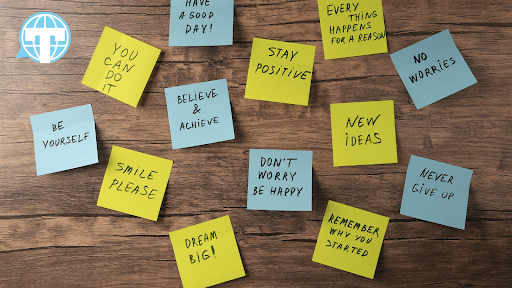Virtual Assistant Help & Insights
What Does a Virtual Assistant Do? 6 Powerful Tasks to Boost Your Business
What does a virtual assistant do? Learn the essential tasks VAs handle—like admin, social media, and design—so you can focus on growing your business.
Read MoreFind Your Perfect VA Match
Fill out the form below so we can connect you with a skilled Virtual Assistant based on your needs and goals.
How Affirmation Can Reshape Your Daily Life

Affirmation is a powerful daily practice that can positively influence mindset, behavior, and mental clarity—supported by psychological research and structured implementation.
What Is an Affirmation?
An affirmation is a concise, positive statement designed to promote self-belief and mental well-being. Commonly used in personal development and psychological practices, affirmations help reinforce constructive thoughts by replacing negative self-talk. They are typically stated in the present tense and repeated regularly to influence mindset and behavior.
Affirmations are widely applied in self-help programs, therapeutic interventions, education, and workplace wellness routines. Their simplicity, accessibility, and positive outcomes have made them a common tool for improving mental resilience and clarity.
Psychological Foundations
Scientific studies have shown that it influence how people react to challenges and process information. For instance, a 2016 study published in Social Cognitive and Affective Neuroscience found that affirmations activate the ventromedial prefrontal cortex, which is responsible for self-related decision-making and emotional regulation.
Another study from Carnegie Mellon University indicated that affirmations reduce cortisol, a hormone linked to stress, and support improved performance in high-pressure scenarios. These findings provide evidence that affirmations impact both the brain and behavior when practiced consistently.
Benefits of Incorporating Affirmations
Practicing daily can lead to several improvements in mental and emotional well-being. Key benefits include:
- Strengthened focus and reduced stress levels
- Improved emotional regulation and resilience
- Enhanced productivity and goal orientation
- Reinforced positive self-perception over time
These benefits are not instant but tend to develop gradually through consistent use.
How to Use Affirmations Effectively
Affirmations can be easily added to a person’s daily routine without specialized tools. Common approaches include:
- Written Practice: Journaling affirmations each morning or evening.
- Verbal Repetition: Saying them aloud during moments of reflection or transition.
- Reminders: Setting phone alerts with short affirmations throughout the day.
The key to success is not the format but the consistency. Repeating affirmations with intention strengthens their effect over time.
What Makes it Work?
Not all affirmations are equally effective. The most impactful affirmations follow proven psychological structures. They should be:
- Personal: Begin with “I” to create ownership
- Positive: Focus on what you want, not what you wish to avoid
- Present-Tense: Frame as if it is already true
- Specific: Target one idea, belief, or emotion
Examples include:
- “I am prepared and confident in my daily tasks.”
- “I remain calm and capable under pressure.”
- “I am moving steadily toward my goals.”
These statements work best when repeated regularly in a calm, focused state.
Educational and Professional Environments
Educators and employers often use it to promote well-being in structured environments. In schools, affirmations are introduced to help students build self-esteem and classroom focus. In the workplace, they are often part of wellness programs aimed at improving morale and reducing burnout.
In both settings, affirmations are voluntary, non-invasive tools that align with broader mental health strategies. They are generally well-received when implemented inclusively and respectfully.
Tracking Progress
While affirmations are simple in practice, tracking their effects can help validate their usefulness. Over time, individuals may observe:
- Reduced stress in high-pressure situations
- Improved confidence in personal or professional settings
- Increased clarity and motivation toward goals
Maintaining a short weekly log or journal can help reflect on these shifts.
Maintaining a Long-Term Practice
To make it a lasting habit, consistency and repetition are essential. Experts recommend choosing a small set of affirmations—three to five—that reflect current goals or mindset challenges. Revisit and revise them periodically based on your progress and changing priorities.
Pairing with complementary practices such as mindfulness or journaling can further strengthen their impact.
Conclusion
Affirmation is a proven, accessible method for supporting mental clarity, building resilience, and fostering self-belief. Grounded in cognitive psychology and backed by research, affirmations offer a reliable way to influence your mindset and behavior over time.
When used with consistency and intention, it can truly reshape how you think, act, and respond to everyday challenges—making them a powerful addition to any personal development practice.
Related Articles
How to Declutter Your Mind and Life: 10 Powerful Steps for Inner Peace
Learn how to declutter your mind and life with 10 proven steps that boost clarity, focus, and peace of mind....
Read MoreHow to Change Your Thinking: 7 Powerful Steps to Transform Your Life in 2025
Learn how to change your thinking with 7 practical steps to reframe your mindset, build positivity, and create lasting life...
Read MoreWhat to Write About in a Journal: 15 Powerful Ideas for Self Reflection
Learn what to write about in a journal with 15 powerful ideas that boost self-reflection, clarity, and growth. Start meaningful...
Read MoreHow to Improve Your Mindset Daily: 7 Powerful Habits for Success in 2025
Learn how to improve your mindset daily with 7 powerful habits that build resilience, focus, and lasting success in 2025.
Read More



